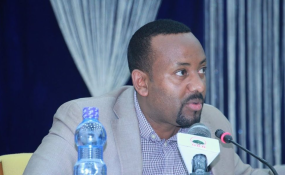
By Salem Solomon And Tsion Girma
Days after swearing in its new prime minister, Ethiopia has begun to make good on promised reforms. In the past week, officials have closed an infamous detention center and released 11 jailed journalists and politicians.
Former prisoners and journalists, however, say that many detainees have simply been moved to different facilities, and they question whether the symbolic closure and releases signify real change.
New prime minister
On April 2, Abiy Ahmed became prime minister after a protracted nomination process following the sudden resignation of his predecessor, Hailemariam Desalegn.
In his acceptance speech, Ahmed emphasized unity.
“From this day forward, we will look at political parties outside of EPRDF (the ruling political coalition) as competitors rather than enemies — their supporters as brothers and sisters who have alternative ideas and who love their country — and as a collection of citizens,” Ahmed said.
Concrete steps followed.
On Thursday, politicians and journalists who had been jailed for participating in an illegal gathering in late March were released. Most had been imprisoned previously.
A day later, the government announced that it had closed Maekelawi Prison, a detention center and police station in Addis Ababa, the capital.
When he announced the decision to close Maekelawi at a press conference broadcast on state-owned media in early January, then-Prime Minister Desalegn linked the facility to atrocities committed by the Derg, a regime that lost power in the late 1980s, and said the facility would become a museum.
Dissidents, former prisoners and human rights groups, however, say the prison is more than a symbol of an ugly past. They say detainees at Maekelawi have continued to experience inhumane conditions.
In a 2013 report on the prison and an attached police station, Human Rights Watch concluded that abuses at Maekelawi were widespread.
“Police investigators at Maekelawi use coercive methods on detainees amounting to torture or other ill-treatment to extract confessions, statements and other information from detainees. Detainees are often denied access to lawyers and family members. Depending on their compliance with the demands of investigators, detainees are punished or rewarded with denial or access to water, food, light and other basic needs,” according to HRW.
‘Not about the walls and the people inside’
Now that Maekelawi has closed, activists and former prisoners question whether authorities will ensure inhumane treatment doesn’t persist at other facilities around the country.
Chaltu Takele was accused of belonging to the Oromo Liberation Front, a group the government considers a terrorist organization, and she spent nearly a decade in prison, including time at Maekelawi.
“I am very happy that Maekelawi is closed, for sure,” Takele told VOA’s Amharic service. “However, at the end of the day, it is not about the walls and the people inside, but the people who are doing these deeds and torturing people.”
What counts isn’t closing a particular facility, she added, but changing “the psyche of the people” who commit inhumane acts.
Emawayesh Alemu, who was also imprisoned for many years, echoed those thoughts.
“If Maekelawi is closed and another Maekelawi is opened, there is no change. If they open another facility, how can we say Maekelawi is closed?” Alemu said.
Nigist Yirga, who was arrested for participating in protests, described unbearable conditions.
“Maekelawi is like hell on Earth. We didn’t know the difference between day and night. A young person going into that detention center comes out crippled and carried by people as someone who couldn’t walk anymore,” she said.
“At night they make you go naked — men and women are forced to get naked. They used to make me stand naked, and they used to tell them to make me walk barefoot as my feet were wounded on the cold tile floors,” Yirga told VOA.
Getachew Shiferaw, the editor of the news website Negere Ethiopia, was detained at Maekelawi and documented inmates’ experiences. He told VOA that the closing is meaningless.
“The people who were subjected to unjust treatment in Maekelawi are still in prison,” he said.
Shiferaw named multiple detainees who had been tortured at Maekelawi and were transferred to Kaliti Prison, also in Addis Ababa. Several of those prisoners had been maimed or made sterile after the trauma they experienced, he said. Others were held in solitary confinement for months at a time.
Reconciliation
To move forward, Shiferaw said, the ruling coalition, the Ethiopian People’s Revolutionary Democratic Front, must not only close facilities and release prisoners but also own up to its misdeeds.
“EPRDF needs to admit to and acknowledge the atrocities that happened in the detention center, just like how they admit that there has been bad governance and corruption issues. They have to admit the inhumane treatment committed in Maekelawi. They need to
acknowledge it now because they will be criticized for it tomorrow — these deeds that force people to hate their own country and treat people inhumanely and isolate them,” he said. The government must also provide medical treatment and support services for prisoners now suffering from long-term health problems, Shiferaw added. Until then, Shiferaw and other former prisoners await the release of all dissidents and restitution for those who have been subjected to unbearable pain and humiliation.
Comments
Post a Comment